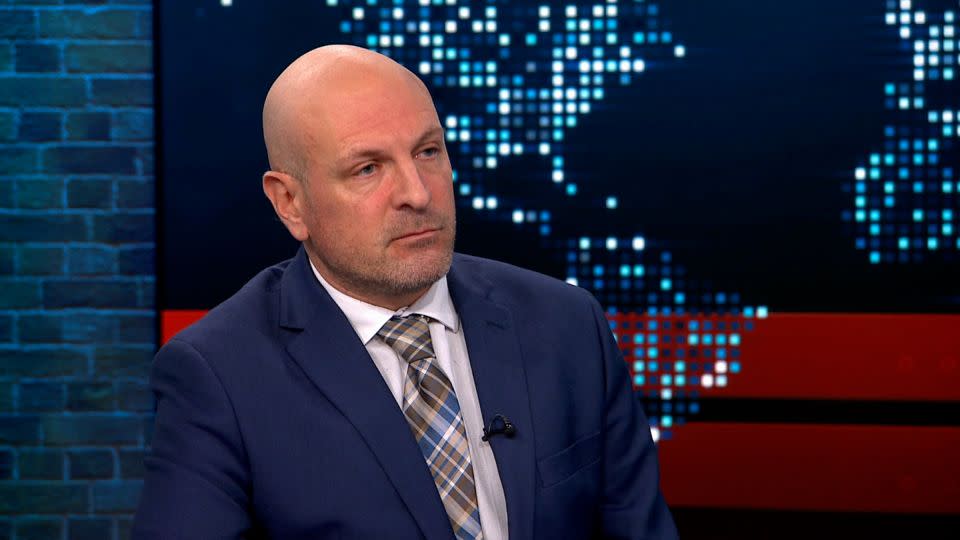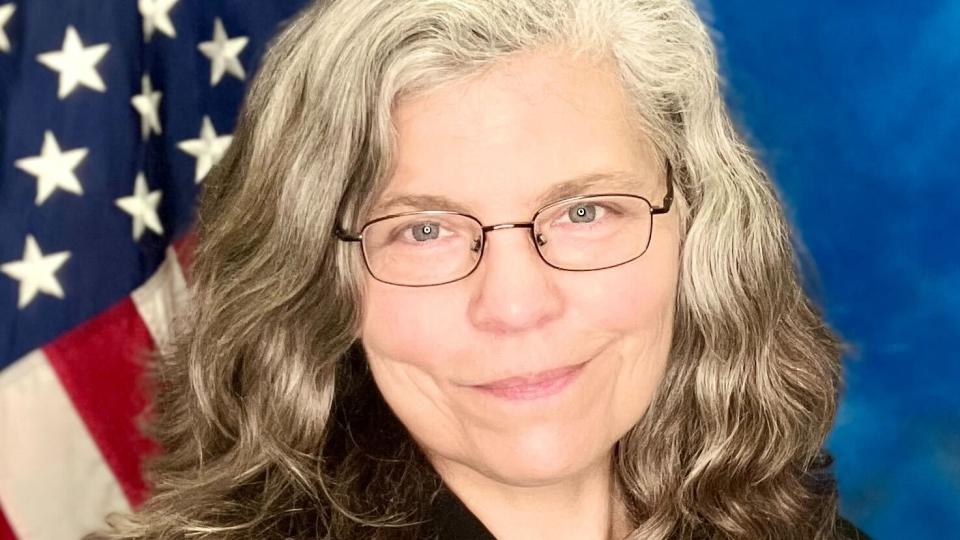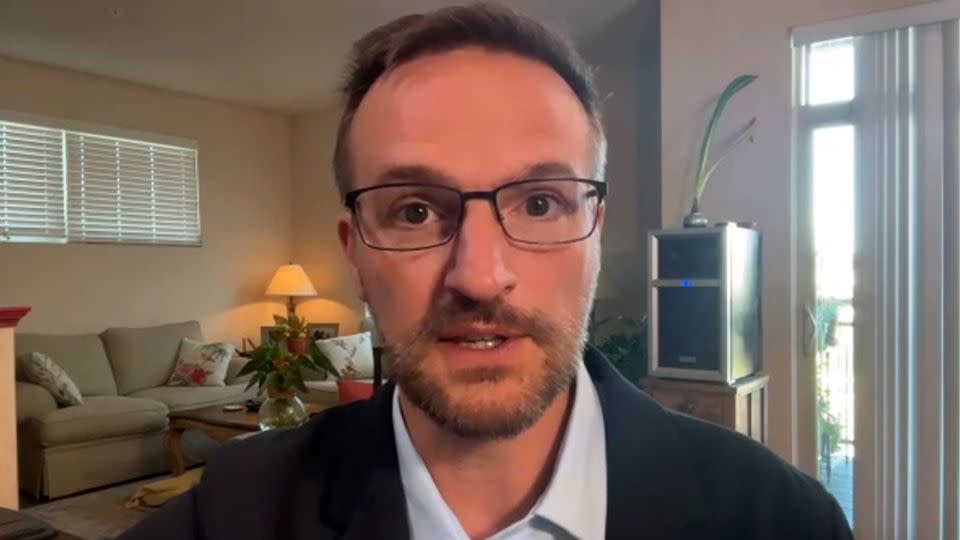US officials who resigned over Biden’s Gaza policy are working together to put pressure on admin
A group of US officials who publicly resigned over the Biden administration’s Gaza policy are banding together to support ongoing dissent and put pressure on the government to change course.
More than half a dozen people from across the US government have left their jobs in public protest, saying they could no longer work for the administration, and even more have quietly departed. Many of the officials who resigned publicly said they would instead seek to have an impact outside the government.
President Joe Biden has faced pressure both abroad and at home over his support for Israel eight months into the war in Gaza with Hamas – a conflict that has cost tens of thousands of civilian lives, displaced millions and brought extreme hunger throughout the enclave. Although the rhetoric from the administration has become harsher – with warnings that Israel must do more to protect civilians and allow more aid in – the policies have remained largely unchanged.
The former officials who resigned publicly – Josh Paul, Harrison Mann, Tariq Habash, Annelle Sheline, Hala Rharrit, Lily Greenberg Call, Alex Smith, and Stacy Gilbert – said that they felt their perspectives, expertise and concerns were not being heeded, and that the administration was willingly ignoring the humanitarian toll caused by Israel’s military campaign. They spoke of the damage they felt US policy on the war is having on the country’s credibility and a sense that the administration did not fully grasp that impact.
All the officials who have resigned publicly and spoke with CNN said they have many colleagues who are still within the government but agree with their decision to leave.
Providing support and advice to those colleagues – whether they choose to leave or continue to dissent from within – is one of the key reasons that they have come together collectively. Another key reason, they said, is to increase the pressure on the administration to change course.

“We’re thinking about how we can use our shared concern and to continue to press together for change,” said Paul, a State Department official who publicly resigned in protest in October, becoming the first US official to do so.
“When you have numerous career professionals and presidential appointees … who have resigned over this policy, it’s an indicator that something is going wrong,” Mann told CNN.
Some of those who publicly resigned had particular breaking points; others said it was the collective toll of incidents throughout the conflict.
Gilbert, a career diplomat with more than two decades of experience, told CNN she had been working on the highly-anticipated report on Israel’s use of US weapons and whether it had restricted humanitarian aid – but then, “at some point, the subject matter experts who were working on that report were removed, it was moved up to a higher level.”
She did not see the report until its public release on May 10. It found it “reasonable to assess” that US weapons have been used by Israeli forces in Gaza in ways that are “inconsistent” with international humanitarian law but stopped short of officially saying Israel violated the law. It also concluded that Israel had not withheld humanitarian aid to Gaza in violation of the law.
Gilbert said that while the first conclusion was “more honest than I’d seen us be,” the second was “absolutely not true.”
“It is not the opinion of experts in the US government, experts on humanitarian assistance. It is not the opinion of organizations on the ground in Gaza. So to see that in the report, stated so clearly, that we assess that Israel is not blocking humanitarian assistance – it was appalling, It was absolutely appalling. And that’s when I decided to resign,” she said, calling the report’s conclusion a “political” one.

“To say it undermines our credibility is an understatement,” Gilbert said. Gilbert left the State Department in May.
Biden administration officials have said that they respect differences of opinions.
“We listen to people. We want to hear their opinions. We want to hear the expertise that they bring to bear. But ultimately, it is the president, the secretary, other senior officials that make the decisions about what the policy of the United States ought to be,” State Department spokesperson Matthew Miller said this week.
US Agency for International Development (USAID) Administrator Samantha Power said in an interview with NPR this week that “we have a lot of views at USAID that are critical of US foreign policy. We have views that believe we are pushing and doing everything we can, and my job is to hear those views, and particularly those that are informed by facts on the ground and ideas about what more we can do.”
“Because the situation is abhorrent. Civilians are living in unimaginable terror and in unimaginable deprivation. So if there weren’t people, particularly in an agency like USAID, that is rooted in humanitarian and development mission, who are unhappy about where we are, that would be disappointing in its own right,” she said.
‘Resignees’ aiming to use ‘collective power’
The “resignees,” as Smith called them, have all been in touch with each other and are “hoping to use our collective power to speak in press releases to make our voices well, to speak for many of the staff who are still employed and cannot speak because they would like to keep their jobs, which is a very fair thing.”
“If we can be a resource to help others find their voice, find a way to try to affect some policy change, that would be useful,” said Gilbert, noting there may be new ways that people within the administration make their disagreement over the policy heard.

“The strategy may be changing from writing one dissent cable that many people sign on to individuals writing their own” she said, referencing the formal State Department channel to express opposition, so that “people have a way to express what they feel in particular about this and to get a response to each person individually based on their dissent to this policy.” Someone from the department’s leadership commits to sit down with those who file dissent cables.
Mann said he has advised people with concerns to both “put them in writing and ask your supervisor or ask your chain of command to give you an assurance with their name on it that what you’re doing is in compliance with both international and US law and with the ethical standards of the organization that you work for.”
Smith, who worked for four years at USAID, said he had always found the policies toward Gaza to be “lacking” and that his frustrations about the US policies around the war had been building. The “final straw,” however, was the cancelation of a presentation he was slated to give on the maternal and child health impacts of the “collective punishment of civilians,” he said.
“It was apparently the final straw also for USAID because they did come back with that ultimatum that I could resign or be terminated because of personality differences,” he told CNN. He left the agency in May.
A USAID spokesperson said the agency “did not take any personnel actions in response to this presentation,” adding that, “as an agency, we value and intentionally seek out a diversity of viewpoints.”

Some of the officials who publicly resigned said they realized in the wake of the October 7 Hamas attack on Israel that the response from the Israeli government was likely to be extreme.
Greenberg Call, a former Interior Department employee who became the first Jewish political appointee to publicly resign, told CNN, “I spent the first few weeks after that reeling from dealing with the trauma and the impact of that and the grief of losing people, but I also knew almost immediately that whatever was going to happen, as a reaction, as a response, was going to be really brutal, really, really horrible.”
She said she was “disappointed” from the outset by the administration’s response, but “wanted to see what I could do from the inside because of the proximity to power that I had.”
She told CNN she felt the concerns she shared were ignored, and “if anything, I was somewhat marked as a troublemaker.”

“There did just come a point where I personally could no longer be in integrity with myself and be representing the administration,” she said. She left in May.
Mann, an Army officer who worked at the Defense Intelligence Agency, made the decision to resign in November, just weeks after October 7. He is Jewish and the first member of the intelligence community to publicly resign.
“It was the function of basically hopelessness about the course of the war in Gaza,” he said, telling CNN that it seemed clear to him early on that “the Israelis were going to be indiscriminately killing huge numbers of civilians,” and that was not going to impact US support. Mann explained that leaving was a “very slow and drawn-out process,” so he didn’t actually leave his job until this week – and he didn’t tell people the reason for his resignation until recently for fear of becoming “persona non-grata.”
“I realized after the fact that if I had aired my concerns to my colleagues, and maybe also to my superiors earlier on, I think I would have found a lot of sympathetic ears. And I wish that I’d done that,” he said.
Many officials told CNN they spoke with other officials who had resigned publicly to seek advice before going public with their own resignations.
“There’s no manual for how to publicly resign from your job in protest, so it was helpful to talk to people who had done it,” Greenberg Call said.
This story has been updated with additional reporting.
For more CNN news and newsletters create an account at CNN.com


